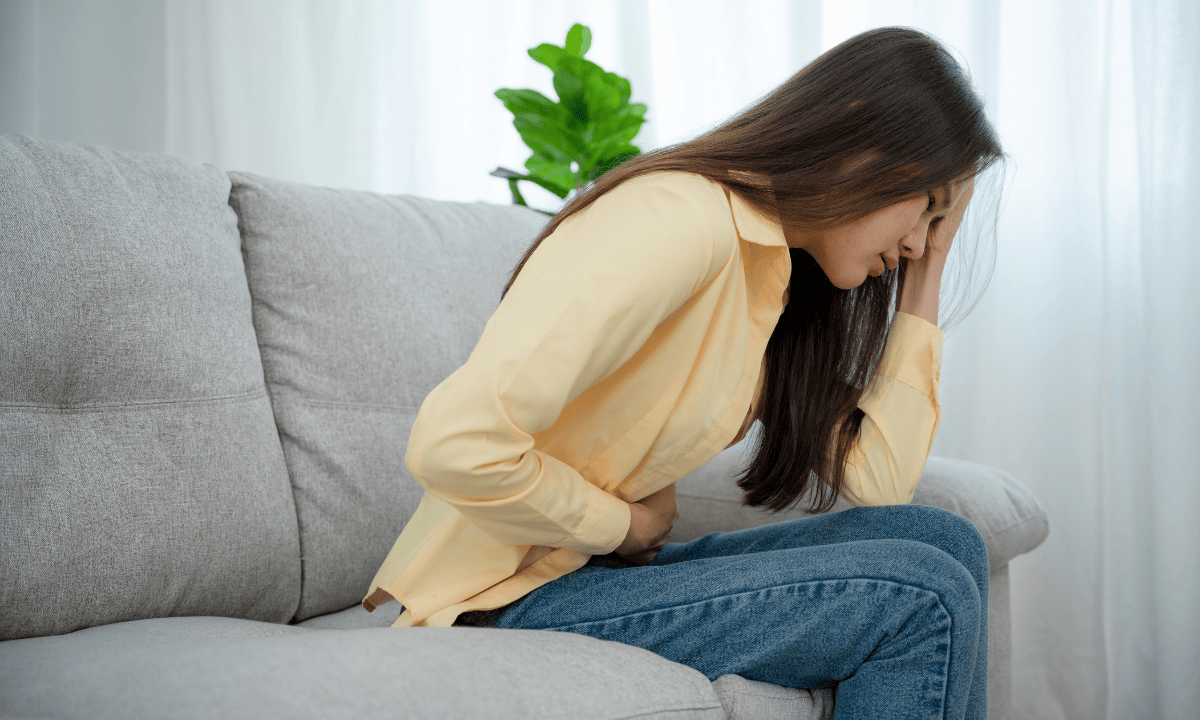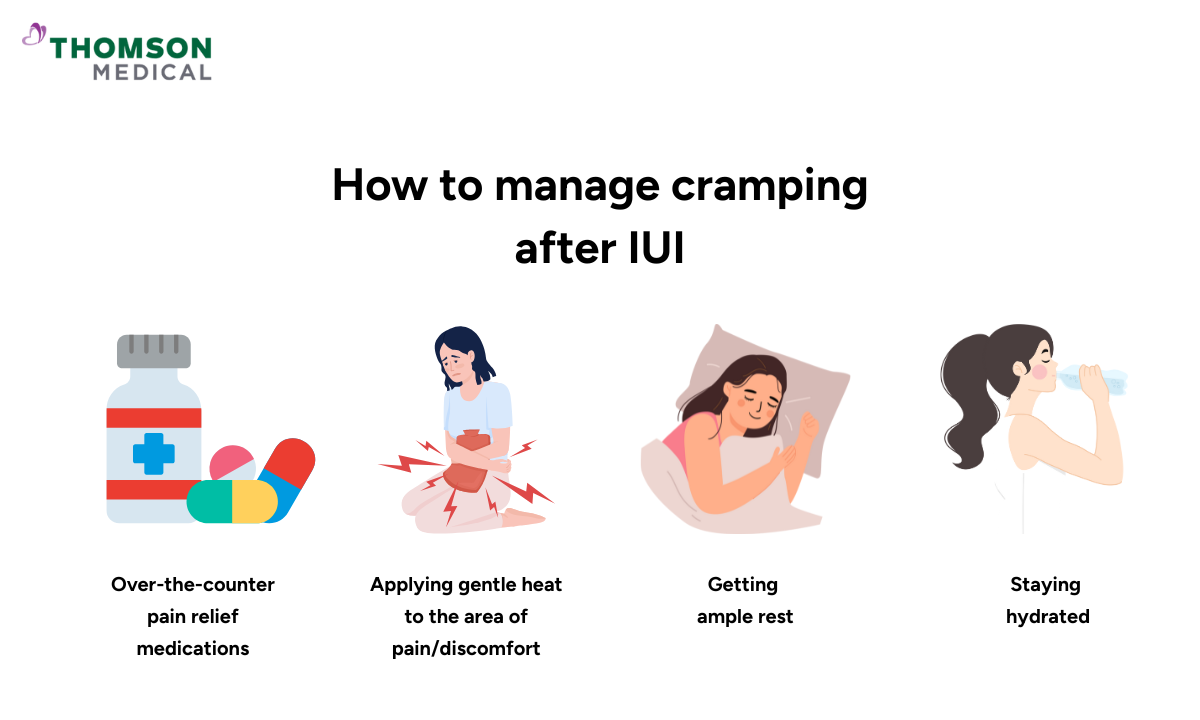Intrauterine Insemination (IUI) is a simple fertility treatment that many choose if they are having fertility issues. During the procedure, your doctor uses a thin, flexible tube that passes through the cervix to place specially prepared sperm into the uterus.
The process is usually quick and non-invasive. Some women may, however, feel slight cramping during and after the treatment.
What is cramping?
A cramping sensation is a very familiar and common complaint. These are a pulling or aching sensation in the lower abdomen. They can happen for many reasons, such as menstruation, ovulation, or even as a response to fertility treatments like IUI.
These sensations are short and mild; however, it is always recommended to inform your doctor if they become severe or uninterrupted.
What to expect after IUI?
After going through an IUI procedure, you may notice some of the physical and emotional changes in yourself. These changes are common and occur due to the fertility medications you have taken, natural hormone shifts, and your body’s natural response to the procedure. Common symptoms include:
Light cramping or bloating
Spotting or light bleeding
Breast tenderness
Mood swings or anxiety during the two-week wait (TWW)
Fatigue
The above symptoms might be similar to those of premenstrual syndrome (PMS) or early pregnancy.
Is cramping after an IUI normal?
Yes, cramping is a common part of the post-IUI experience. It can happen shortly after the procedure or a few days later, especially as your body prepares for possible implantation. While it may feel uncomfortable, mild to moderate cramping is typically nothing to worry about.
When does it usually start and for how long?

When might cramping happen?
Right after IUI:
You may feel mild cramping soon after the procedure. This often happens because the catheter needs to pass through the cervix, which can briefly irritate the area.
2–7 days after IUI:
Some people notice cramping a few days later. This can be related to the implantation process, when a fertilised egg attaches itself to the uterus.
How long does cramping last?
For most, cramps are mild and last only a few minutes to a few hours. Occasionally, you may experience intermittent cramping over a few days. If cramps become very painful or don’t go away, please check in with your doctor. It’s always okay to ask for reassurance or advice, your comfort and peace of mind matter.
If you’re unsure whether what you’re feeling is normal, reaching out to your care team can help you feel more supported.
What causes cramping after IUI?
Cramping after an IUI procedure is quite common and can happen for various reasons. Here’s what you might want to know:
Implantation cramps
Around 6–12 days after ovulation, you might feel mild cramps if a fertilised egg attaches to the lining of your uterus.
These cramps are usually mild and brief and may come with a little spotting.
Not everyone experiences implantation cramps, but it’s perfectly normal if you do.
Hormonal changes
After ovulation, your progesterone levels naturally increase.
These hormone changes can sometimes make your uterus more sensitive, leading to mild cramping or discomfort.
Changes in the uterine lining
To prepare for a possible pregnancy, the lining of your uterus thickens.
This natural process can cause minor aches or twinges in your lower abdomen.
Fertility medications
Medications used in fertility treatments (like Clomid or ovulation trigger shots) can stimulate your ovaries.
You may notice mild cramping, a sense of bloating, or even some discomfort in the area of your ovaries during this time.
Signs of implantation
Early pregnancy often brings subtle symptoms like mild cramps or light spotting, sometimes called implantation bleeding.
While these signs are reassuring for some, it’s also normal not to notice them.
Ovarian Hyperstimulation Syndrome (OHSS)
Occasionally, fertility medications can cause a condition called OHSS.
If you develop:
Severe pain or swelling in your belly
Rapid weight gain
Significant nausea or vomiting
Please contact your healthcare team promptly, as your comfort and safety are important.
If you ever feel uncertain about your symptoms, or if your cramps become intense or prolonged, don’t hesitate to check with your doctor.
For more information about IUI and to receive advice tailored to your unique situation, consider speaking with a fertility specialist. You may contact Thomson Medical to arrange a consultation for personalised guidance on treatment options and the next steps in your implantation procedure.
Our fertility specialists
Loading...
How to relieve cramping after IUI?

If you're feeling some cramping after your IUI, there are simple ways to ease the discomfort while supporting your body during this sensitive time:
-
Take a rest:
-
Give your body time to recover by avoiding strenuous activities for the first day or two after your procedure.
-
-
Use a warm compress:
-
Placing a warm (not hot) pack on your lower belly can soothe mild cramps and relax your muscles.
-
-
Stay hydrated:
-
Drinking plenty of water helps reduce bloating and keeps your body functioning well.
-
-
Try gentle movement:
-
A short walk or light stretching can improve circulation and ease discomfort.
-
-
Avoid medications like ibuprofen:
-
Nonsteroidal anti-inflammatory drugs (NSAIDs) may interfere with implantation, so only take them if your doctor says it's okay.
-
When should you consult a doctor?
While most symptoms after IUI are completely normal, there are certain signs that warrant immediate medical attention. Your body will usually give you clear signals if something isn't quite right, so it's important to trust your instincts and reach out to your fertility team when needed.
Please reach out to your fertility specialist promptly if you notice any of these symptoms:
-
Severe or worsening abdominal pain:
-
While mild cramping is expected, intense pain that gets worse over time could indicate complications that need immediate attention.
-
-
Heavy bleeding, similar to a period:
-
Very light spotting is not a problem, but heavy bleeding, as heavy as your menstrual flow, can be caused by various reasons and must be checked.
-
-
Fever or chills:
-
These could be signs of infection, which require prompt treatment to protect your health and any potential pregnancy.
-
-
Dizziness or shortness of breath:
-
These symptoms could indicate a more serious reaction that needs immediate medical care.
-
-
Signs of OHSS:
-
If you've been taking fertility medications, watch for symptoms like severe bloating, rapid weight gain, nausea, or difficulty breathing.
-
Remember, your medical team is there to support you throughout this journey. It's always better to call and have peace of mind than to worry unnecessarily. Most fertility clinics have on-call services specifically for these situations, so don't hesitate to reach out if you're concerned about any symptoms you're experiencing.
FAQ
Can implantation occur 1 day after IUI?
Implantation usually does not happen just one day after IUI. Your body needs time for the fertilisation process to occur and the embryo to develop before it can be implanted in your uterus. Implantation typically takes place 6-12 days after ovulation, which means you might start noticing early signs around 7-10 days after your IUI procedure.
What are the symptoms of a successful IUI?
You may or may not feel any symptoms in the early days after IUI, and both are completely normal. Possible early signs of pregnancy include:
-
Light cramping or spotting (known as implantation bleeding)
-
Sore or tender breasts
-
Feeling unusually tired
-
Mild nausea
-
A consistently higher basal body temperature
-
A positive home pregnancy test (usually around 12–14 days after IUI)
What are the early signs of failed IUI?
It’s natural to look for signs during the two-week wait, but outcomes can vary from person to person. Some early signs that the IUI may not have been successful include:
-
You don’t notice any pregnancy symptoms during the two-week wait (though many women experience none, even if they are pregnant).
-
Your menstrual period starts around 14 days after the IUI.
-
Following your missed period, you may get a negative pregnancy test.
Remember, only a pregnancy test can confirm whether the IUI was successful, so try to give your body time before drawing conclusions.
Does cramping stop after successful implantation?
Implantation cramping is typically brief and mild, lasting only a day or two. If you experience cramping that continues beyond this timeframe, it's usually related to other hormonal changes happening in your body rather than ongoing implantation. However, you should discuss any severe or persistent cramping (if you have) with your fertility team.
What is the most common implantation day?
In most cases, implantation occurs 8 to 10 days after ovulation. Since your IUI is timed to coincide with ovulation, you can expect implantation to happen around 8 to 10 days after your procedure, depending on the exact timing of your cycle.
How do I know if my IUI is successful?
The only reliable way to know is through a positive pregnancy test, typically done 14 days after your IUI. A blood test (beta-hCG) provides the most accurate confirmation.
The information provided is intended for general guidance only and should not be considered medical advice. For personalised recommendations based on your medical conditions, request an appointment with Thomson Medical.
For more information, contact us:
Thomson Fertility
- Paragon: 6252 7766
Thomson Specialists (Women's Health)
Request an Appointment